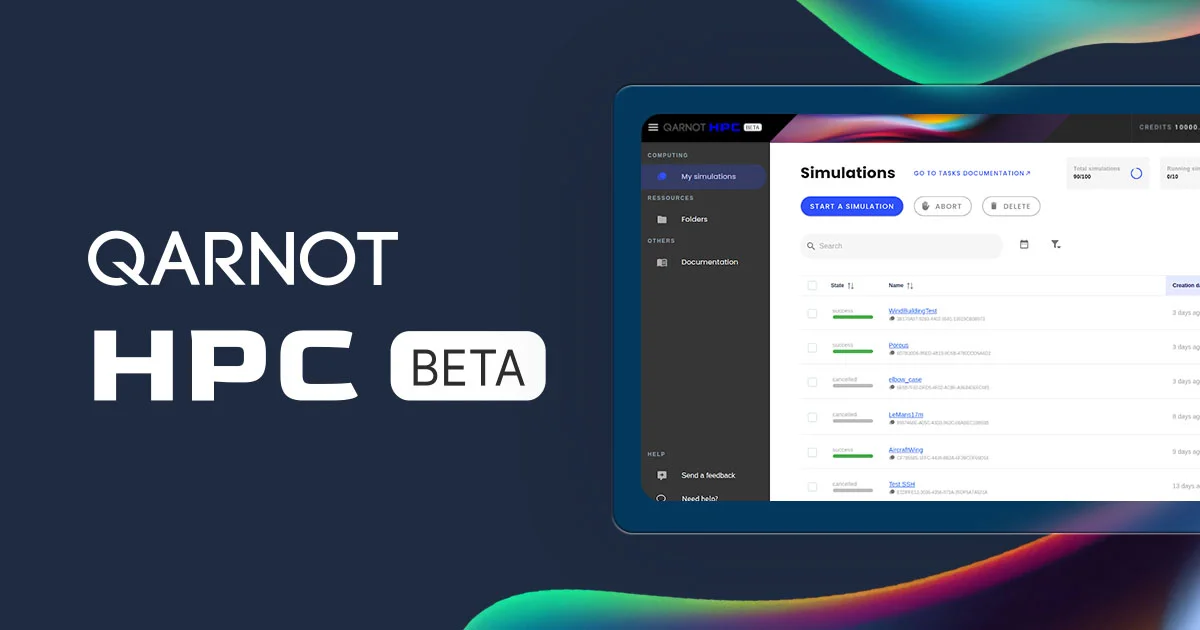
Qarnot has launched a new HPC-as-a-Service platform for R&D engineers, with a clear ambition: to democratize high-performance computing and establish a new European standard. Accessible in minutes, the solution combines ease of use, compatibility with leading industry software, and workflow automation, allowing engineers to focus on innovation rather than the complexity of IT systems. Designed and operated in Europe, the platform combines performance, sovereignty, and sustainability, offering a competitive alternative to traditional cloud providers and strengthening Europe’s ability to control its strategic technologies.
With its European HPC-as-a-Service (HPCaaS) solution, Qarnot simplifies access to high-performance computing by removing IT complexity and enabling engineers to focus on their core mission: solving complex problems.
“Our platform was designed to deliver a radically simplified experience. In just a few clicks, an engineer can create and configure a cluster, select the type of servers and number of cores, and launch a simulation. Monitoring is available in real time directly in the browser: logs appear instantly, convergence graphs update dynamically, and the user can act immediately to correct a non-convergence and avoid wasted compute hours,” said Clément Pellegrini, CTO and co-founder of Qarnot.
The platform integrates with major industry solvers and adapts to any workflow via an intuitive web interface, APIs, SDKs, and CLI tools. It streamlines simulation projects into four key steps:
This simplicity is underpinned by full control of the technology stack. Qarnot designs and operates its infrastructure end-to-end, with servers optimized for simulation workloads—ranging from AMD EPYC Genoa processors with 96 cores to Intel Xeon architectures calibrated for parallel computing. Inter-node communications rely on RDMA over Converged Ethernet, and storage on Lustre, ensuring maximum performance for parallel workloads.
High-performance computing, once confined to research labs and supercomputing centers, has become a key driver of industrial competitiveness. In aerospace, automotive, energy, and space, companies now rely on computer-aided engineering (CAE) software to design and virtually test products. These tools enable large-scale digital simulations that replace part of physical experimentation, accelerate development cycles, and reduce costs.
In practice, European companies still face major obstacles in accessing HPC. On-premises clusters require heavy capital investments and entire teams to operate them. General-purpose clouds, often presented as an alternative, prove ill-suited: little or no industry integration, technical complexity, unpredictable costs, and no guarantees on data location or security. The consequences are clear: uncontrolled expenses, long waiting queues, abandoned simulations due to lack of resources, lost time for R&D teams, and growing dependence on foreign technologies. This slows down innovation, weakens European competitiveness, and deprives R&D teams of the tools they need to iterate faster, validate more hypotheses, and explore new design avenues.
Beyond performance and simplicity, Qarnot embodies a deeply European vision of cloud HPC, based on structural choices that make it a unique model. The company has built proprietary infrastructure: modular, compact racks with integrated heat-reuse systems that reduce energy dependence and control operating costs. Servers are deployed exclusively in Europe, in partnership with district heating networks, following a decentralized approach that limits geopolitical risks and guarantees full compliance with local regulations. This model reduces environmental impact, cutting the carbon footprint of simulations by up to 80%, while offering prices on average twice as competitive as traditional clouds.
On the hardware side, Qarnot leverages the Open Compute Project standard, enabling it to diversify supply chains, control machine firmware, and avoid vendor lock-in. On the software side, the stack is largely open-source (Linux, Docker, Proxmox, Ceph, Lustre) augmented with in-house developments for critical components such as APIs, SDKs, and schedulers.
“Our technological independence shields our clients from hyperscaler price increases, protects them from dependence on vendors subject to foreign legislation, and guarantees complete freedom of technological choice with stable, predictable costs,” said Paul Benoit, President and co-founder of Qarnot.
Security and legal sovereignty complete this foundation. A French company backed by European investors, Qarnot operates and hosts all of its data exclusively in Europe. Its platform is ISO 27001 and HDS certified, meeting the strictest security standards, including for sensitive data hosting. And because the company controls the entire value chain,from infrastructure design to end-user services, it maintains full control over its pricing policy, ensuring long-term stability.
With the launch of its HPCaaS platform, Qarnot is setting a new European standard for high-performance computing: sovereign, sustainable, and accessible. By combining performance, simplicity, sovereignty, and sustainability in a single offering, Qarnot positions HPC as a direct lever for competitiveness and innovation.